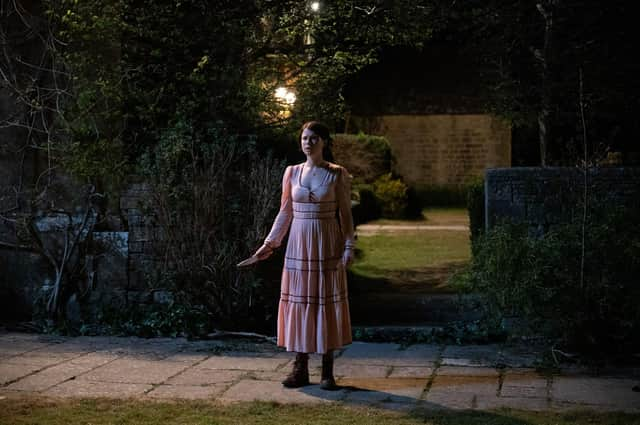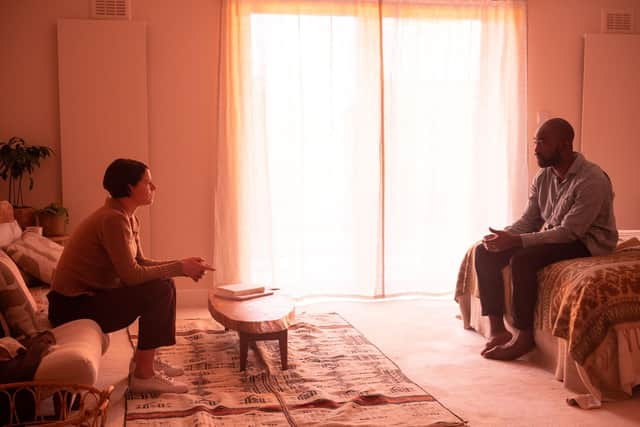Film reviews: Men | Dashcam


Men (15) **
Dashcam (18) ****
Alex Garland isn’t what you would call subtle filmmaker. In calling his new horror freakout Men, the Ex-Machina director is essentially hanging a lantern on its toxic masculinity themes before the movie has even begun. Revolving around a woman who retreats to the countryside to recover from a marriage gone violently wrong, the film proceeds along bluntly obvious lines, even as it seeks to divert our attention with the intriguing conceit of having its protagonist, Harper (Jessie Buckley), terrorised by a village-full of men who all look like Rory Kinnear. First meeting him in the form of the landlord of the country house she’s decided to rent (he’s a creepily obsequious toff called Geoffrey, whose bumbling eccentricities mask a more insidiously intrusive manner), she politely endures his awkward conversation as he gives her a tour of the 400-year-old house, visibly cringing as he broaches the subject of sanitary product disposal and noticeably flinching when he jokingly chastises her for eating an apple from the garden because it’s “forbidden fruit.” As already noted, Garland doesn’t often miss a chance to explain something that doesn’t require explaining.


That’s too bad, because he can also be good at creating creepy atmospherics, as in the sequence where we follow Harper on a country walk along an old railway line – a pleasant enough jaunt that turns swiftly sinister as she encounters a naked man (also Kinnear) who follows her home. Garland creates two scenes of sustained dread in quick succession by having said figure languish in the background of shots unseen by Harper (one involves an echoey tunnel, the other the conservatory of her rental). All of which bodes well for the film, if not Harper. But as she encounters more of the village’s male population – including a policeman, an obnoxious schoolboy and an Old Testament-espousing vicar – that tension dissipates as their facial similarities go uncommented upon, even as Harper video chats with a sympathetic friend (Gayle Rankin) about the villagers.
Advertisement
Hide AdIs she experiencing a version of Fregoli delusion, the rare condition that plagued the protagonist of Charlie Kaufman’s creepy-sad Anomalisa? Not really, or at least, only in the sense that Garland may have raided Kaufman’s films for ideas (a later pub scene also recalls the surreal moment in Being John Malkovich where the titular actor is confronted with a room full of Malkoviches). As Garland fills in the backstory of Harper’s relationship with her husband, James (Paapa Essiedu), flashing back repeatedly to their final day together, it’s clear everything is going to be a manifestation of the trauma she’s experienced and, sure enough, no matter how viscerally Garland manifests his deep-down-men-are-same thesis, that’s really all there is to it. It doesn’t help that Buckley’s character feels underdeveloped. Or that Kinnear’s performances recall the comic grotesques of The League of Gentlemen. Or that the film's slow-motion opening shot is like a comically bad homage to Lars von Trier’s Antichrist, another emptily provocative film about gender, trauma and original sin, but one that at least had a cohesive set of images and ideas. Garland riffs on folk horror with allusions to the Green Man and other gendered symbols of birth and regeneration, but all of it feels like a distraction from the obviousness of his message. Like a lot of recent horror cinema, Men plays like an academic paper in search of a movie.
No such complaints with Dashcam. The latest from the team behind lockdown horror hit Host is another gonzo scarefest, this time set (and shot) just as restrictions were starting to ease and people were tentatively edging back out into the world. A found-footage monster movie updated for the age of live-streaming sites such as Twitch, it casts LA-based alt-rocker-turned-controversy-magnet Annie Hardy as an obnoxious, Covid-denying social media troll who breaks quarantine to fly to London, ostensibly so she can hang out with her former bandmate, Stretch (Amar Chadha-Patel), but really so she can provide her army of social media followers with a constant barrage of MAGA-influenced, hip-hop infused, edge-lord invective.
Randomly insulting, triggering, and denouncing anyone trying to deal with Covid in a safe, sensible way, she’s an abrasive, dangerous narcissist and the real Hardy’s own views on some of the subjects her character is sounding off about – well documented on social media – hardly endear her. But in the context of a wild ride horror movie about the literal and figurative monsters lurking in the shadows of our freaked-out times, Hardy’s cartoonish riff on her own media persona is compulsively, hilariously watchable, not least because director Rob Savage – working from a script co-written with Gemma Hurley and Jed Shepherd – gives her space to improvise while also orchestrating a rollercoaster of chaos around her that escalates with every antagonistic choice she makes. Urged on by her fervent followers – whose emoji-punctuated comments function like a digital Greek chorus down the side of the screen – her situation goes from bad to worse to outright apocalyptic as she tags along with Stretch on his food delivery route and ends up getting more than she bargained for when she steals his car and agrees to drive a decrepit woman to the countryside for a fee. Like an illicit video nasty from the 1980s, what follows is a short, sharp shot of sick horror movie fun.
Men is in on general release from 1 June; Dashcam is on select release from 3 June and on digital demand from 6 June.